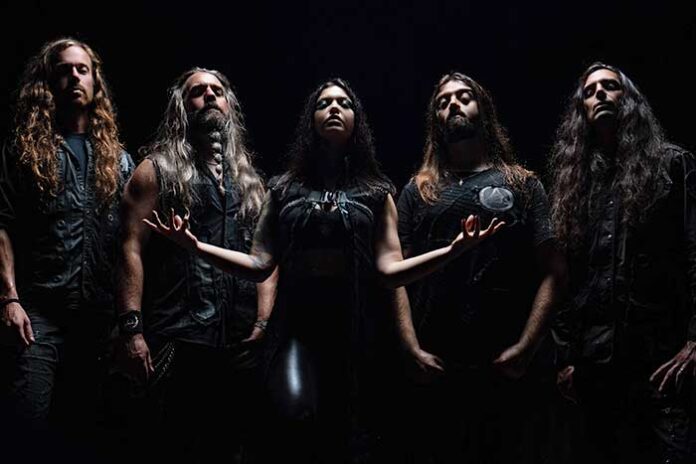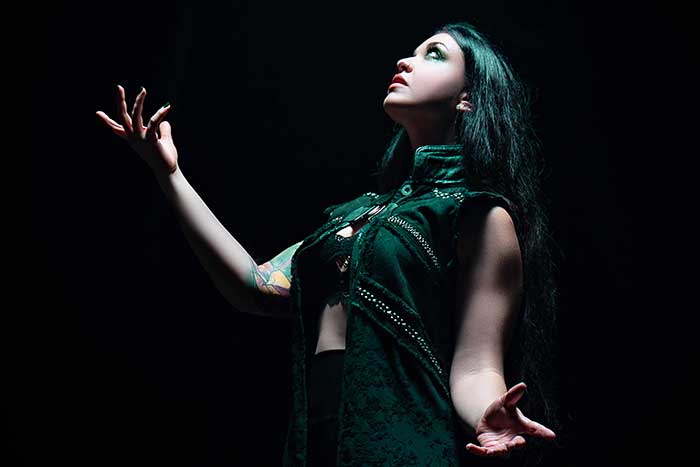
INTERVIEW WITH VICKY PSARAKIS BY KELLEY SIMMS
PHOTOGRAPHS BY ERIC SANCHEZ
Canadian extreme melodic death metal purveyors, The Agonist, rebuilt the band after a major member change in 2014 and have proven themselves time and again. The member change was, of course, the exit of charismatic blue-haired vocalist Alissa White-Gluz to join heavyweights Arch Enemy. After seven years, the hoopla that surrounded her departure has subsided, allowing vocalist Vicky Psarakis, guitarists Danny Marino and Pascal Jobin, bassist Chris Kells, and drummer Simon McKay to focus on what makes The Agonist tick so well. On the heels of its newly released five track EP, Days Before the World Wept, the band is still waiting to finalize a tour to finally start playing live again. During a recent interview, Vicky talked about the new album, lyrical inspiration, and her other musical projects.
Since you reside in Chicago and the rest of the band lives in Canada, how do you find time to rehearse in person? How does your songwriting get done?
All our songwriting is done through file sharing, bouncing off ideas. Thankfully, technology is a big help for that nowadays. We don’t actually need to be in person for that. And then when it comes to rehearsals, we do them when we have a tour planned or a show. I’ll go up to Montreal a week in advance and get some jams in with the band before the tour actually starts.

Most bands are doing it that way now, but there’s nothing like getting together in a room and jamming. How was that camaraderie and feeling like to be able to do that?
Things have definitely changed. I think it depends on the style of music that you’re creating as well. When the band used to jam, they wouldn’t really be coming up with the riffs and the style of music that we actually record. They’d be jamming more rock ‘n’ roll and the blues style because that’s what you associate with a jam. Our music is maybe a bit too technical at times. Let’s say they were playing one of our songs and I was hearing it for the first time in the jam space, it would be impossible for me to come up with vocals on the spot. I need to sit with it alone at home and play the song over and over again and come up with ideas.
“IT WOULD BE IMPOSSIBLE FOR ME TO COME UP WITH VOCALS ON THE SPOT. I NEED TO SIT WITH IT ALONE AT HOME AND PLAY THE SONG OVER AND OVER AGAIN”
What was the recording process like for Days Before the World Wept? Were you able to all record in a studio or did each member record separately?
Some of us were able to go to the studio and record, but it was all individual—just the drummer with the producer, just the bassist with the producer. Due to restrictions we weren’t all allowed to be in the same room. That sucked, but we made it happen. And then I went to Canada in May to record vocals, but I had to do a two week quarantine and take multiple COVID tests that had to be negative. It was a bit of an ordeal, but we make sacrifices for our music.
What were you going for sound wise, and what were you trying to achieve?
As a band, by the time we get to the recording phase, we’ve already tweaked our demos back and forth. I have all the vocals recorded from a demo stage, so all that’s left is that I show up and I rerecord everything again. Sometimes there may be some changes that happen in the studio, but not often. Honestly, the songs are usually so worked on that by the time we record, the final result isn’t that far off from the demo.
What does the album cover symbolize? How does the album title, Days Before the World Wept, and theme all tie together?
The album artwork was done by a friend of mine from Greece. He’s a guy that loves his creative freedom, just like I do. When I contacted him, he told me to send over the lyrics, and the lyrics inspired him to create that. As soon as we saw it, we loved it. Sometimes you don’t need to ask questions or be a control freak and just go with the artist and give them directions. Sometimes it’s nice to have an artist and let them do what they want to do, and I think it works really well with our music. In terms of the title itself, Days Before the World Wept, it’s the title track. There’s a song on the album with that title, and I felt like it was very strong. Out of all the songs, I felt like it was powerful enough to be the EP title as well.
“THE THEME ON THIS EP IS ABOUT DEATH, THE AFTERLIFE, AND RESURRECTION AND ALL THAT POST-APOCALYPTIC STUFF”
Why an EP this time around? Your last full-length was Orphans in 2019.
People’s attention span nowadays is not what it used to be. Not many people will grab an album and put it on and listen to it from start to finish without being distracted or without doing something else. That’s why you do see a lot of people put out just singles after singles instead of full-length. I certainly don’t hope that the full-length output is going to die out because I personally love listening to an album from beginning to end, especially when it has a story to tell. But for us, it concluded really well with five songs. When we had five songs, it flowed really well together. It made sense. There was no one song that felt out of place. And given that we also didn’t have too much of an opportunity to tour with Orphans because of the pandemic and the uncertainty of when this pandemic would end, I did not want to put out another full-length and not be able to tour and show it to the world. So, the EP was the right middle ground.
What are some of the inspirations for the lyrics on this EP?
The lyrics are based mostly on fiction. They’re not my own life experiences or anything like that because the theme on this EP is about death, the afterlife, and resurrection and all that post-apocalyptic stuff. So, I can’t say I’ve gone through that personally. However, the way the lyrics are written, they’re very relatable. There are messages in there that I have drawn inspiration from my own life or from other people’s stories. The themes are about time, death, and coming back to life and finding the world in a very different state than what you left it in. It is very fiction based, but told in a way that people can relate.

Vocally, you’re very diverse. You have searing highs and guttural lows, and even melodic clean passages. What were you most focused on with your vocal delivery?
First of all, thank you. My versatility when it comes to my vocals is just my own curiosity and my own need to be able to portray different emotions with my voice. When it comes to songwriting, I don’t think in terms of technique. I don’t think, “Here I’m going to hit a super high note,” or, “Here I’m gonna growl as long as I can.” It’s a very natural process. It goes hand in hand with what the lyrics are saying, what the riffs are telling me to do. I go with the flow and sometimes I end up writing very difficult vocal stuff that would be difficult to replicate live, but that doesn’t concern me as much. You have to write a good song, and to write a good song, when you write your lyrics and your vocals, you do what’s best for the song. And you figure out how to do it live. If you can’t do it live, then you can’t record it to begin with. If you can record it to begin with, then you should be able to do it live as well.
“YOU HAVE TO WRITE A GOOD SONG, AND TO WRITE A GOOD SONG, WHEN YOU WRITE YOUR LYRICS AND YOUR VOCALS, YOU DO WHAT’S BEST FOR THE SONG.”
Opening track “Remnants in Time” begins ominously with ghostly piano lines performed by yourself. Did you have this melody line in your head for a while?
I’m self-taught, not trained at all when it comes to piano. I can’t really play anything that’s super complicated. I’m just one of those people when I sit down at a piano I come up with ideas randomly, improvisation. So, that was the case with the piano for “Remnants in Time.” Both the beginning intro and the outro piano were just ideas. I played the track and I played the piano next to it, and it worked.
“Resurrection” goes into some black metal territory with your brutal, guttural death metal vocals. What were you trying to achieve with this song?
“Resurrection” is actually an older song. It’s a song off of Five that never became a single and it didn’t get the attention it deserves. We decided to rerecord it and put it on this EP because we felt like it really fit with the rest of the songs. It’s one of those songs where despite it being old, it doesn’t feel out of place. It feels like it could have been written when all the other songs were written. The fact that we rerecorded it years later, it sounds much better. None of the melodies changed on “Resurrection.” It was all written five years ago. My delivery is better because I’m a better vocalist now than I was then. That song in particular has the catchiest chorus we’ve ever written, and it only happens once in the song. It’s one of my favorite songs that we we’ve ever written.
You’ve been in the band since 2014. What’s the camaraderie and musical chemistry like these days?
Everything’s fine. I mean, we live in different cities. I’m in a different country, so we don’t see each other too often unless there’s band business involved. I was the last person to join the band, that was the last lineup change, and we’ve been together for seven years. I think that in itself is a good indication of how well we work together.
“WE’VE BEEN TOGETHER FOR SEVEN YEARS. I THINK THAT IN ITSELF IS A GOOD INDICATION OF HOW WELL WE WORK TOGETHER.”
Are you still involved in your other projects such as E.V.E., Rage of Romance, or Sicksense?
The first two—one was a studio project and the other I was hired as a guest vocalist to record the album. None of them were actually bands or ever meant to take off and tour and do multiple discographies or anything like that. Before The Agonist, I never had a full-time band. This was my first. Sixsense is actually a newer band that we started in 2018, but there have been delays because every member is in other bands as well. We’re all in different cities, but that is ongoing. We put out our first single a few months ago. So, that’s a brand new, fresh band that is completely different from what I’m doing with The Agonist. We’ll see where it leads.
What do you hope to achieve or accomplish for the rest of the year? Obviously, the band getting back on the road is probably the biggest thing.
Yeah, we want to, but there’s nothing concrete right now. We’re working on the US tour in spring 2022, rescheduling the South American tour that’s constantly being postponed, and the Europe festivals, summer festivals that have been postponed as well this last year. We were supposed to have a European tour this year, but that got canceled as well. So, there are question marks because the world is opening up, but it’s not opening up everywhere. Canada is a bit behind in that. There are still severe restrictions when it comes to shows. Shows aren’t really happening there yet, but I do hope that it changes soon enough because obviously everyone in the band is dying to go and play a show and go on tour again.




















